
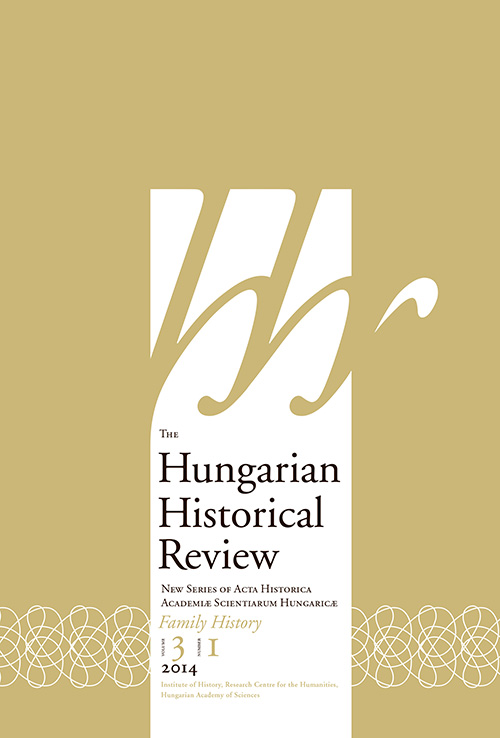 The first issue of Volume 3 (2014) of The Hungarian Historical Review has been published! This special thematic issue is entitled "The History of Family, Marriage and Divorce in Eastern Europe".
The first issue of Volume 3 (2014) of The Hungarian Historical Review has been published! This special thematic issue is entitled "The History of Family, Marriage and Divorce in Eastern Europe".
Annual subscriptions: $80/€60 ($100/€75 for institutions), postage excluded.
For Hungarian institutions HUF7900 per year, postage included.
Single copy $25/€20. For Hungarian institutions HUF2000.
Send orders to The Hungarian Historical Review, H-1250 Budapest, P.O. Box 9. Hungary; e-mail: .
 Anne Applebaum’s most recent book, Iron Curtain: The Crushing of Eastern Europe, 1944-1956 (published in 2012) has been published in Hungarian, and for the premiere of the Hungarian edition she was invited to the Institute of History, RCH HAS, on April 25, 2014.
Anne Applebaum’s most recent book, Iron Curtain: The Crushing of Eastern Europe, 1944-1956 (published in 2012) has been published in Hungarian, and for the premiere of the Hungarian edition she was invited to the Institute of History, RCH HAS, on April 25, 2014.
Anne Applebaum was introduced by the Deputy Director of the Institute, Attila Pók, who praised her works on the Communist regimes. Her previous book, Gulag: A History, was published in 2003 and won the Pulitzer Prize for non-fiction in 2004.
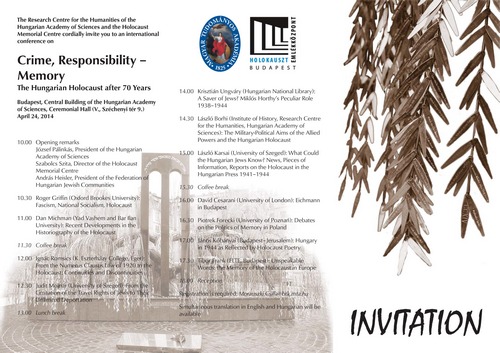 The Research Centre for the Humanities of the Hungarian Academy of Sciences and the Holocaust Memorial Centre organized an international conference on Crime, Responsibility – Memory. The Hungarian Holocaust after 70 Years on April 24, 2014, in the Central Building of the Hungarian Academy of Sciences, Budapest. The conference was opened by József Pálinkás, President of the Hungarian Academy of Sciences, Szabolcs Szita, Director of the Holocaust Memorial Centre, Budapest, and András Heisler, President of the Federation of Hungarian Jewish Communities. The program can be read here.
The Research Centre for the Humanities of the Hungarian Academy of Sciences and the Holocaust Memorial Centre organized an international conference on Crime, Responsibility – Memory. The Hungarian Holocaust after 70 Years on April 24, 2014, in the Central Building of the Hungarian Academy of Sciences, Budapest. The conference was opened by József Pálinkás, President of the Hungarian Academy of Sciences, Szabolcs Szita, Director of the Holocaust Memorial Centre, Budapest, and András Heisler, President of the Federation of Hungarian Jewish Communities. The program can be read here.
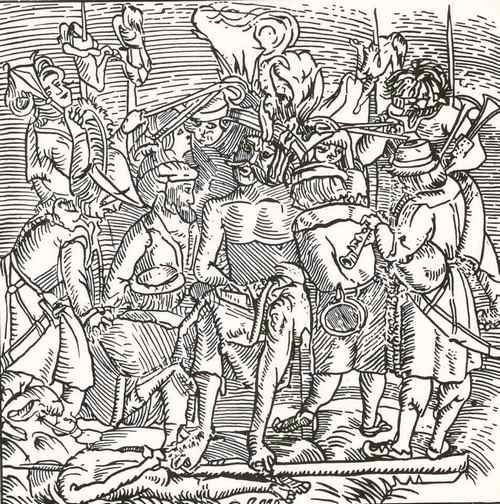 On May 22-23, 2014 the international conference Revolt, Violence and Memory: Peasant Uprisings in Late Medieval and Early Modern Europe will be organized at Budapest by the Institute of History, Research Centre for the Humanities (RCH), Hungarian Academy of Sciences (HAS) and Refo500. The major aim of the conference, held on the occasion of the 500th anniversary of the Hungarian peasant uprising of 1514, is to re-contextualize this uprising and revolts in early modern Europe more generally by adopting the interdisciplinary and comparative methods of social and cultural history.
On May 22-23, 2014 the international conference Revolt, Violence and Memory: Peasant Uprisings in Late Medieval and Early Modern Europe will be organized at Budapest by the Institute of History, Research Centre for the Humanities (RCH), Hungarian Academy of Sciences (HAS) and Refo500. The major aim of the conference, held on the occasion of the 500th anniversary of the Hungarian peasant uprising of 1514, is to re-contextualize this uprising and revolts in early modern Europe more generally by adopting the interdisciplinary and comparative methods of social and cultural history.
More information about the conference can be found here, on the RefoRC website: http://www.refo500.nl/rc/news/view/978/conference-revolt-violence-and-memory.html. The program can be read here.
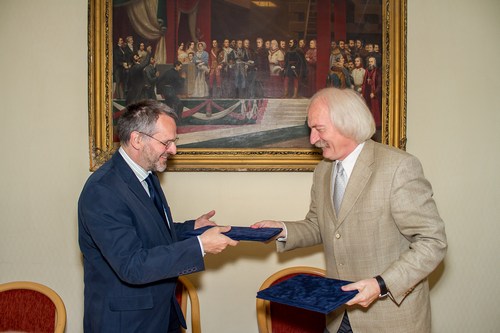 Pál Fodor, Acting Director General of the Research Centre for the Humanities of the Hungarian Academy of Sciences (MTA BTK) and Péter Farbaky, Director General of Budapest History Museum signed an Agreement of Cooperation on March 31, 2014. The two institutions (from the MTA BTK part, especially the Institute of History, Institute of Archeology and Institute of Art History) have had cooperation for decades in the research of important sites and events of the Hungarian medieval history, including organizing conferences and exhibitions together.
Pál Fodor, Acting Director General of the Research Centre for the Humanities of the Hungarian Academy of Sciences (MTA BTK) and Péter Farbaky, Director General of Budapest History Museum signed an Agreement of Cooperation on March 31, 2014. The two institutions (from the MTA BTK part, especially the Institute of History, Institute of Archeology and Institute of Art History) have had cooperation for decades in the research of important sites and events of the Hungarian medieval history, including organizing conferences and exhibitions together.
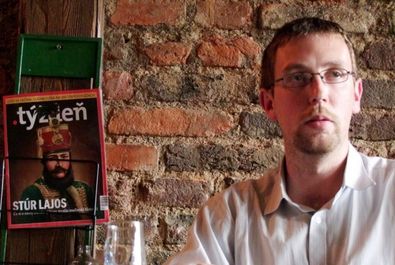 A new bilingual, Slovak–Hungarian historical journal (Kor(r)idor. Szlovák–Magyar Történeti Folyóirat/Slovensko–maďarský historický časopis) has been founded in cooperation of the Research Institute of the National Self-Government of Slovaks in Hungary, the Institute of History of the Research Center of Humanities of the Hungarian Academy of Sciences, the Institute of History of the Slovak Academy of Sciences and the Forum Minority Research Institute. The editorial board consists of members of the founding institutions (one member from each institute; our Institute of History is represented by Csaba Katona, fellow of the Research Assistance Team). József Demmel editor, fellow of the Research Institute of the National Self-Government of Slovaks in Hungary were interviewed by the Slovak newspaper L'udové Noviny about the aim, the plans and the significance of the new journal (the interview can be read here. The goal of the new periodical is to provide a permanent bilingual platform which will enable continuous dialogue on history and better understanding between the two countries and nations; presenting and intermediating the results of scientific research activities towards Slovak and Hungarian professional public, the students and the inquirers; and successful exploration of the common past. The first issue will be published soon.
A new bilingual, Slovak–Hungarian historical journal (Kor(r)idor. Szlovák–Magyar Történeti Folyóirat/Slovensko–maďarský historický časopis) has been founded in cooperation of the Research Institute of the National Self-Government of Slovaks in Hungary, the Institute of History of the Research Center of Humanities of the Hungarian Academy of Sciences, the Institute of History of the Slovak Academy of Sciences and the Forum Minority Research Institute. The editorial board consists of members of the founding institutions (one member from each institute; our Institute of History is represented by Csaba Katona, fellow of the Research Assistance Team). József Demmel editor, fellow of the Research Institute of the National Self-Government of Slovaks in Hungary were interviewed by the Slovak newspaper L'udové Noviny about the aim, the plans and the significance of the new journal (the interview can be read here. The goal of the new periodical is to provide a permanent bilingual platform which will enable continuous dialogue on history and better understanding between the two countries and nations; presenting and intermediating the results of scientific research activities towards Slovak and Hungarian professional public, the students and the inquirers; and successful exploration of the common past. The first issue will be published soon.
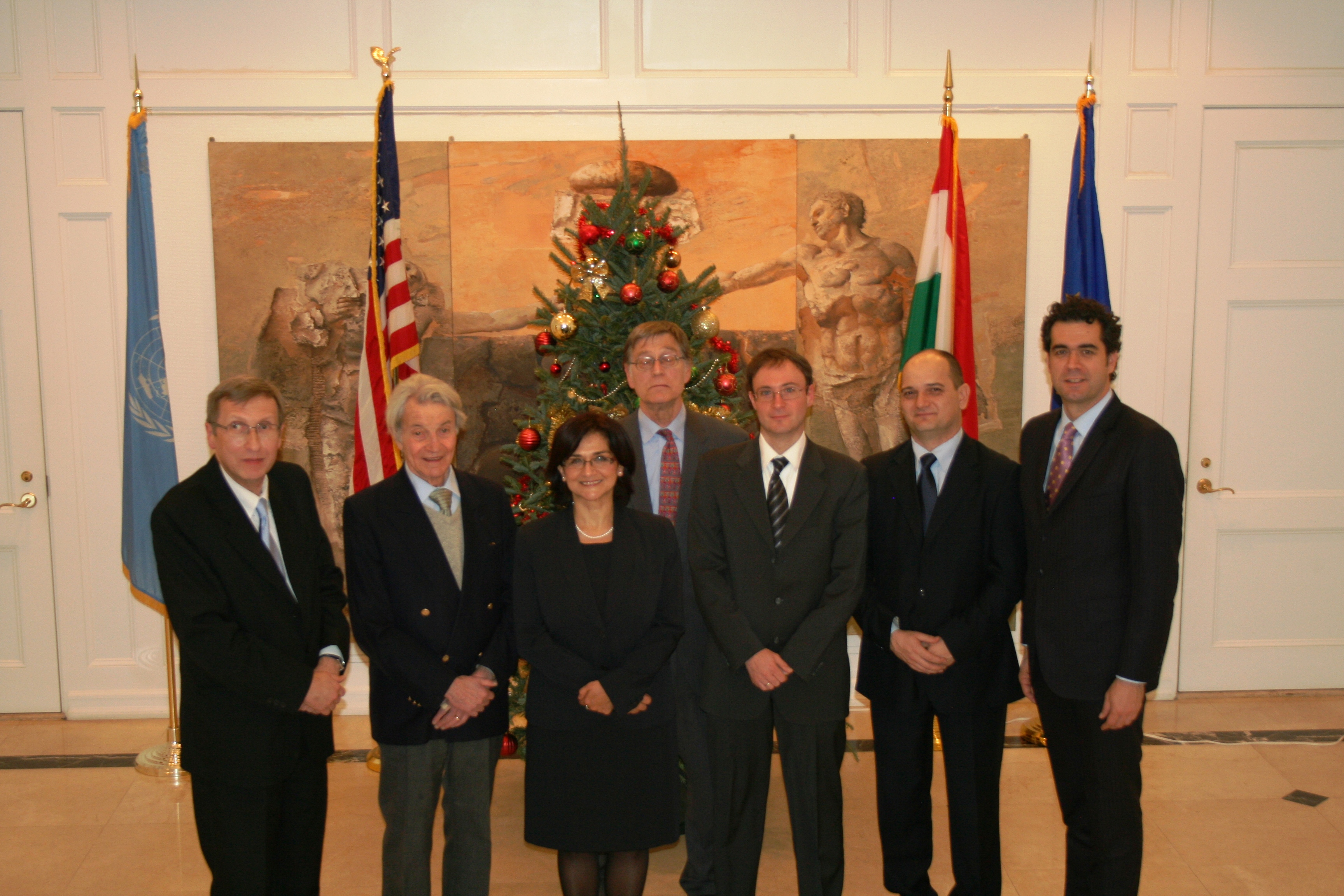 Attila Pók, Deputy Director of the Institute of History, RCH HAS, presently guest professor of Columbia University of New York organized a lecture series titled The Cultural Legacy of Transylvania as the annual event of the Istvan Deak Visiting Professorship at Columbia University at the Consulate General of Hungary in New York, on December 10, 2013, in cooperation with Columbia University Donald and Blinken European Institute, Columbia Harriman Institute, Columbia East Central European Center, the Consulate General of Hungary in New York, and the Balassi Institute. Two of the lectures were held by research fellows of our Institute of History: Stefano Bottoni (Szeklerland in the 20th century: an internal periphery?) and Teréz Oborni (The „Golden Age” of Transylvania – the 17th Century).
Attila Pók, Deputy Director of the Institute of History, RCH HAS, presently guest professor of Columbia University of New York organized a lecture series titled The Cultural Legacy of Transylvania as the annual event of the Istvan Deak Visiting Professorship at Columbia University at the Consulate General of Hungary in New York, on December 10, 2013, in cooperation with Columbia University Donald and Blinken European Institute, Columbia Harriman Institute, Columbia East Central European Center, the Consulate General of Hungary in New York, and the Balassi Institute. Two of the lectures were held by research fellows of our Institute of History: Stefano Bottoni (Szeklerland in the 20th century: an internal periphery?) and Teréz Oborni (The „Golden Age” of Transylvania – the 17th Century).
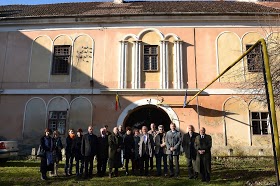 Research fellows of our Institute of History, RCH HAS (Pál Fodor Director General, Attila Zsoldos research professor, leader of the Medieval Research Team, László Glück research assistant of the Early Modern Research Team, Stefano Bottoni senior research fellow of the Contemporary Research Team, Klára Jakó associate research fellow of the Neighbourhood Review Section) took part in the events of the Day of the Hungarian Science in Transylvania on November 22–23, 2013.
Research fellows of our Institute of History, RCH HAS (Pál Fodor Director General, Attila Zsoldos research professor, leader of the Medieval Research Team, László Glück research assistant of the Early Modern Research Team, Stefano Bottoni senior research fellow of the Contemporary Research Team, Klára Jakó associate research fellow of the Neighbourhood Review Section) took part in the events of the Day of the Hungarian Science in Transylvania on November 22–23, 2013.
Page 5 of 12